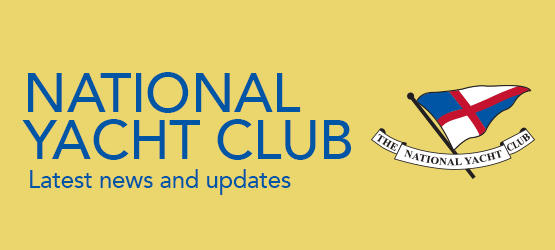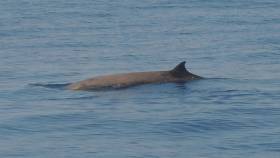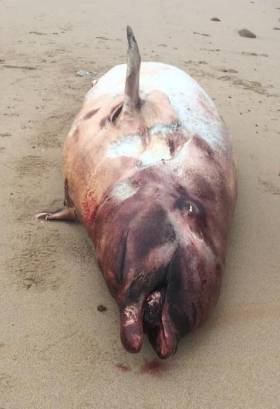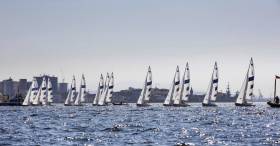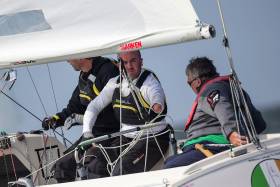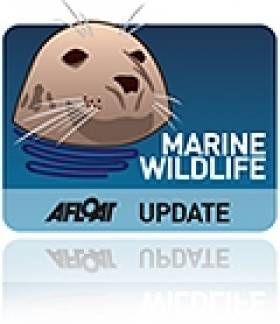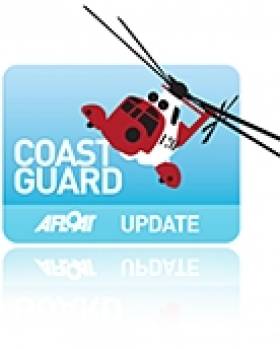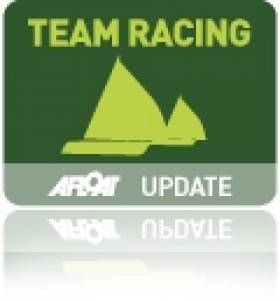Displaying items by tag: sonar
New Study Calls For Ban On Sonar Use In Waters Vulnerable To Mass Whale Strandings
#MarineWildlife - Spanish researchers have identified a link between a ban on the use of sonar in waters around the Canary Islands 15 years ago and a reduction in whale strandings in the same region.
The Independent reports on the study from the University of Las Palmas de Gran Canaria that suggests vulnerable deep-diving species, such as beaked whales, respond to the stress of sonar pulses by fleeing to deeper waters — putting them at increased physical risk from the increases pressures below.
The scientists also recommend a ban on “mid-frequency active sonar” where mass strandings are prevalent.
Other experts have cited the findings as further evidence that seaborne military exercises using sonar as are direct threat to marine wildlife and in particular beaked whales — the subject of a devastating mass stranding across Scottish and Irish waters last year.
Tests on tissue samples from stranded beaked whale carcasses along the Scottish coast ruled out disease as a cause of death.
Britain's Royal Navy has denied its use of sonar is responsible for the “unusual mortality event” — regarding which the Irish State announced it would assist in investigations.
The Independent has much more on the latest findings HERE.
Whale Deaths off Irish West Coast May Have Been Caused by Sonar
#MarineWildlife - Five dead whales have been found along Ireland's west coast and as BBC News reports, they may have been caused by naval sonar, an expert has said.
Dr Simon Berrow, of the Irish Whale and Dolphin Group (IWDG), said the Cuvier's beaked whales' deaths were "highly unusual".
Three of the whales washed ashore in Co. Donegal on 4 August while another was discovered 12 miles off shore.
A beaked whale was also discovered in Co. Mayo on the same day.
Dr Berrow said usually about three strandings of beaked whales were reported in Ireland every year.
For more on this story, click here.
Twomey & Paralympic Crew Finish 12th In Sonar Race Three
In the only race of the day for the Sonars on the second day of the Rio Paralympic sailing regatta, Ireland's John Twomey from Kinsale Yacht Club with crew Ian Costelloe and Austin O'Carroll finished 12th from 14 to put them 13th overall after three tricky races sailed in the 11–race series so far. Results are here.
The Canadian team, led by Beijing 2008 2.4 gold medallist Paul Tingley, held on for a very tight win after a good start. Only two seconds separated the top three on the Pao de Acucar (Sugarloaf Mountain) race area.
Australia's Colin Harrison, Russell Boaden and Jonathan Harris remain top of the leaderboard on eight points with a fifth placed finish to add to their impressive first day. Day two, however, belonged to Canada's Tingley, Logan Campbell and Scott Lutes who move up to second place on 11 points with the only bullet on offer.
Waiting for the wind is not uncommon in sailing and sailors have their own way of dealing with the wait. For Canadian helm Tingley, he seemed to be enjoying the onshore facilities available to him before the Race Committee sent the fleet afloat, "It was a hot day at 37 degrees with the wind from the north. We were postponed so we were getting some cool A/C in the lounge. Then they decided to send us out as the wind was not going to change from the north, a direction which is very uncommon, so no sea breeze.”
Despite moving out of the comfort of the cool air, the early movement to the water from Tingley and crew paid dividends, "We were first onto the water and started to do our homework which helped us get a jump on the competition. The wind was a little right and then a little left, but we managed to get the first right shift to lead the race. Towards the end of race it flipped to the right and we had to change our game plan. With a couple of gybes towards the finish we came out on top by a nose.”
Whether or not it's the race win talking, Tingley seems to be enjoying what the first South American Games has to offer, "We love Rio so far. It's very variable, light winds and currents, you need to be always changing gears. I really like that 'thinking' type of racing. It's not just a one-way simple track, you must play the shifts and play snakes and ladders.”
Falling behind from the start, Norway's Aleksander Wang-Hansen, Marie Solberg and Per Eugen Kristiansen rounded the first mark in seventh overall, but the London 2012 bronze medallists are made of sterner stuff.
They pulled the race back in to their grasp to take the lead and were arguably favourites to push on for the win, but their progress was halted by a gybe which let their rivals back in. They lost out to Canada by just one second and sit sixth overall on 17 points.
Wang-Hansen explained the Norwegians day through his eyes, "It was a shifty, patchy, gusty day. Really tricky. We had a great start, but things didn't roll our way on the first upwind. But then we caught up a lot on the next two legs to be leading into the finish. We were certain that we were first, but we see now on the results that Canada just beat us.”
Just one second off Norway in the single race of the day were Vasilis Christoforou, Anargyros Notaroglou and Thodoris Alexas (GRE) who not only got third in the race, but mirror that on the leaderboard where they sit on 12 points.
A story possibly developing in the Sonar fleet is the 'curse' of the world champions. France (twice), Great Britain and USA are all world champions in the quad, but relatively slow starts on day one, backed up with mid to low placed finishes on day two means the highest positioned world champions are Alphonsus Doerr, Hugh Freund and Bradley Kendell (USA) in seventh overall. But a World Championship title isn't won by giving up or taking the bad to heart, so watch out in the next few race days for possible leaderboard climbers.
The 2016 Para World Sailing Championships came to a breathtaking finale in Medemblik, the Netherlands as the final race of the championships decided the medals in the Sonar fleet.
Arguably the most exciting race of the day was in the Sonar fleet as the gold medal changed hands continuously throughout. Ireland's John Twomey, Austin O'Carroll and Ian Costelloe were ninth overall in the 16–boat fleet.
Norway's Aleksander Wang-Hansen, Marie Solberg and Per Kristiansen took a bullet in the first race of the day to bunch the top four together, only separated by six points going in to the final race. The battle was on.
The final race started with USA on top, but they fell behind early and were down on the predictive rankings. Australia and Great Britain moved ahead and they changed top position on the predictive. Throw in Norway who moved up the fleet. Then USA came back. The top four on the leader board were the top four on the course fighting it out.
Great Britain's John Robertson, Hannah Stodel and Steve Thomas took the bullet, but only just from Australia's Colin Harrison, Jonathan Harris and Russell Boaden. The Britons had to wait and see if Norway could do them a favour and beat the American's to the line. They couldn't. USA's Alphonsus Doerr, Bradley Kendell and Hugh Freund had done it, they were world champions.
Describing the race, Kendall said, "The last race of the day, last race of the regatta, we knew who we had to cover and we were happy with our start, we knew where they were. The first shift we actually didn't sail to the right side that we wanted to and we had to fight our way back, but we did that.”
With four team's vying for the medals in such a close contest, Kendall was happy to get the job done, "This world championship was a very tight regatta. The world's best were here and we are so happy with what we have done and where we are at right now.”
Where they are right now is on the top of the podium and 2016 Para World Sailing Champions with 26 points.
With the final bullet of the championships, John Robertson, Hannah Stodel and Steve Thomas took the silver medal on 27 points with Colin Harrison, Jonathan Harris and Russell Boaden taking the bronze on 28.
Irish Paralympic Sailors Fall Back Two Places
Ireland are again in fouth place of the nine contenders for one of six remaining places on the start line at the Paralympics in Rio next year.
In challenging conditions the Irish Paralympic Sonar Sailing team fell back two places today to 9th overall with a 6th and 8th place in races seven and eight of this eleven race regatta.
Following the squalls and high winds of yesterday afternoon and with a forecast for further high winds this afternoon the race committee decided to bring forward the time of racing today today from 13.00 to 11.00 so as to avoid the front.
With three more races to go, John Twomey, Skipper of the Irish Sonar Paralymic team, said: "What a shifty Day with wind speed between 2 and 18 knots and 35 degree wind shifts. A 6th and 8th place finish in the 2 races reflected our conservative approach to this regatta. We consolidated our qualification position for Rio 2016. That is the big prize we came here for."
Today also saw a widening of the gap within the Sonar fleet where the difference in finishing times between the first and last boat averaged at least eight minutes which is significant at this high level of competitive racing. The final two days of racing have all the signs of some further great competition on the water.
Among the 18 boats in the Sonar fleet, Australia, Canada, France, Germany, Britain, Greece and Norway have already booked their place at Rio 2016.
However Ireland, Israel, Italy, Japan, South Korea, New Zealand, Spain, the United States and the US Virgin Islands will be chasing the remaining six spots on offer, with three teams set to miss out on berths for the Games.
The Irish Paralympic Sailing Team comprising John Twomey, Ian Costello and Austin O'Carroll is campaigning to qualify for the 2016 Rio Paralympic Games. This final qualifying event is being hosted by one of the oldest sailing clubs in Australia, the Royal Yacht Club Victoria, Williamstown, Melbourne from November 28th to the 3rd of December 2015. The event comprises of eleven races, two for each of the first five days with the final race on Dec 3rd.
The team compete in the 23 foot Sonar Class, which for Paralympic events is a two sails keelboat. The Irish team are currently ranked 5th in the world.
Entries from 31 countries and 81 boats comprising 142 sailors are competing for just 35 places to participate in the 2016 Paralympic Games in Rio, Brazil next year. The fleet of sailors across three different types of boats include 45 sailing the 2.4mR (single person boat), 18 sailing the SKUD 18 (two person boat) and 18 sailing the Sonar (three person boat).
In total, 35 athletes, across three fleets of boats will book their spot at Rio 2016 in Melbourne. Seven spots in the 2.4mR, five in the SKUD18 and six in the Sonar will be up for grabs.
Ireland Lying Mid–Fleet at Paralympic Worlds – Day One
Irish Paralympic Sailors at the end of day one lie mid fleet in the 2015 Para Worlds Sailing Championships in their bid for a place on the start line in Rio next year.
In beautiful sailing conditions of 11-14 knots of wind, with bright blue skies Ireland's paralympic sailors lie in 9th place at the end of day one, in the middle of the fleet at the 2015 Para World Sailing Championships in Williamstown, Melbourne, Australia. More importantly, of the nations seeking to qualify for a place on the start line in Rio next year at the paralympics, Ireland are in 4th position out of a possible six places.
With nine more races to go, John Twomey, Skipper of the three man Sonar crew said: "We had a good start today, with a hard earned 4th place in race 1. Our 2nd race was costly, as on the first beat (sailing upwind) the wind filled in better on the left side of the course while we chose the right hand side. The fleet was extremely compact in both races. A good day tomorrow is essential."
Among the 18 boats in the Sonar fleet, Australia, Canada, France, Germany, Britain, Greece and Norway have already booked their place at Rio 2016.
However Ireland, Israel, Italy, Japan, South Korea, New Zealand, Spain, the United States and the US Virgin Islands will be chasing the remaining six spots on offer, with three teams set to miss out on berths for the Games.
The Irish Paralympic Sailing Team comprising John Twomey, Ian Costello and Austin O'Carroll is campaigning to qualify for the 2016 Rio Paralympic Games. This final qualifying event is being hosted by one of the oldest sailing clubs in Australia, the Royal Yacht Club Victoria, Williamstown, Melbourne from November 28th to the 3rd of December 2015. The event comprises of eleven races, two for each of the first five days with the final race on Dec 3rd.
The team compete in the 23 foot Sonar Class, which for Paralympic events is a two sails keelboat. The Irish team are currently ranked 5th in the world. Racing out of the Royal Yacht Club of Victoria in Williamstown, a small suburb of Melbourne, competitors are seeking to qualify for a place on the start line in the Paralymic Games in Rio, Brazil 2016. The Irish team need to secure a place in the top six overall in this championship to secure their place on the start line in Rio de Janeiro next year.
Entries from 31 countries and 81 boats comprising 142 sailors are competing for just 35 places to participate in the 2016 Paralympic Games in Rio, Brazil next year. The fleet of sailors across three different types of boats include 45 sailing the 2.4mR (single person boat), 18 sailing the SKUD 18 (two person boat) and 18 sailing the Sonar (three person boat).
In total, 35 athletes, across three fleets of boats will book their spot at Rio 2016 in Melbourne. Seven spots in the 2.4mR, five in the SKUD18 and six in the Sonar will be up for grabs.
New Research Says Sonar Sends Whales Scurrying
#MarineWildlife - The Guardian reports on new research which proves that military sonar has a direct effect on the behaviour of whales in our oceans - even leading to mass strandings.
The studies, part funded by the US Navy, found that beaked whales where particularly sensitive to sonar - and that even blue whales, the largest animals on earth, were distracted from feeding by the subsurface noise.
It's long been feared that the use of sonar is to blame for unusual behaviour among whales, who navigate and communicate with each other over long distances using sound.
As previously reported on Afloat.ie, the Irish Whale and Dolphin Group (IWDG) identified sonar activity by Royal Navy submarines as a possible cause of a the mass stranding of pilot whales in Donegal in November 2010, in which as many as 35 whales died.
Now for the first time, sonar has been proven to affect behaviour of cetaceans to a detrimental degree, confirming for many a connection between the use of sonar technology and recordings of whale and dolphin strandings identified since the 1950s. The Guardian has much more on the story HERE.
In more positive whale-related news, the IWDG reports that its next Cape Clear summer whalewatching course over the weekend of 26-28 July is "filling up nicely".
Places are still available but as it coincides with the tourism high season in West Cork, anyone interested is advised to book sooner than later to ensure they have someone to stay nearby.
The most recent weekend course over the June bank holiday witnessed numerous harbour porpoises and common dolphins, but its hoped the elusive whales will make an appearance next time round!
Howth Coast Guard Operates New Side Scan Sonar
#COASTGUARD - Howth Coast Guard will be one of the first search and rescue teams to avail of the Irish Coast Guard's new side scan sonar, it has emerged.
The specialised underwater sonar is available for 24/7 response on rivers, lakes, harbours and at sea.
The device is towed under the water and feeds a live scan of the area below it to a laptop operator on the surface.
The system can detect objects of all sizes and can be used to assist with the search of a missing person, for example, to quickly identify or rule out possible search areas before sending in Garda dive teams.
Howth Coast Guard says its menders have been trained up in the operations of the sonar over the last few months, and will be available to respond by request through the National Maritime Operations Centre (NMOC).
Marine Notice on Pipeline Survey in Celtic Sea
#NEWS UPDATE - The latest Marine Notice from the Department of Transport, Tourism and Sport (DTTAS) advises on a pipeline survey in the Celtic Sea next month.
PSE Kinsale Energy Limited will be commencing the survey of the 24" Gas Export Pipeline on 6 March 2012 using the Marine Institute vessel RV Celtic Voyager (call sign EIQN). The survey is expected to last 1 to 2 days, depending on weather conditions.
The survey will take place along the existing pipeline route in the Celtic Sea, between the shoreline at Inch Beach in Co Cork and gas platform 'Alpha'.
The RV Celtic Voyager will display appropriate lights and signals, and will be towing side scan sonar with cables of up to 200m long. A Radio Navigation Warning will be issued via the Irish Coast Guard (schedule Bravo, four times a day) prior to the vessel's arrival at the survey area. The vessel will also keep a listening watch on VHF Channel 16.
All vessels, particularly those engaged in fishing, are requested to give the RV Celtic Voyager and her towed equipment a wide berth and keep a sharp lookout in the relevant areas.
Further details for seafarers, including relevant co-ordinates, are included in Marine Notice No 7 of 2012, a PDF of which is available to read and download HERE.
'2k' Format Will be New Lease of Life for Team Racing
Irish team racers, and those whose college sailing days are behind them, can look forward to rediscovering the joys of a new kind of team racing writes our Correspondent, Magheramore.
The Dutch have discovered team racing. They have become very keen on two boat team racing in keel-boats with 30 teams competing in their National Championships. Realising the potential for this version of the sport a major international event is planned in September this year, and there is a bid to run an official World Championships in 2013.
An international circuit is now emerging for this discipline – now known as 2k. Events are planned on the Clyde, in Italy, Poland, England and the Netherlands. The potential is considerable. In many countries sailing centres have fleets of small one design keel-boats already used for match racing. 2K racing increases the number of days these fleets are in competitive use. There is also a well established circuit in the USA, where the Sonar is commonly used. There are even events organised especially for the more mature sailor.
This should be good news for Irish sailors. We have a long tradition of team racing, with predominately university teams competing in Firefly dinghies. In Munster, the group based around Schull Community College has provided a base for schools team racing, and the whole town did a magnificent job of hosting the Worlds last year. In addition, the Royal Alfred Yacht Club has maintained a tradition of team racing in keelboats with the Patriots Cup, not to forget the Glen class in Dun Laoghaire who compete in the Millennium Cup, a 4 boat per team event. Many graduate sailors have moved on to match racing, using the Sailfleet J80s, with some success.
The development of 2k racing is an opportunity for clubs. Team-racing, in all its forms, creates a dynamic within the club, as teams train and compete and socialise. Graduates, who seem to find the Firefly gets smaller every year, can relive the exploits of their college days without breaking the bank. As events can be graded, adult trainees can experience the joys of competitive sailing at level suited to their ability. Sailing club boats will increasing look an attractive proposition to the negative-equity generation
The initial outlay to procure a fleet of boats may seem a considerable obstacle. However, if the right boat is chosen they can have a long and useful life. There is, for instance, in Brittany, a fleet of Beneteau Class 8s that have been raced hard for 20 years and are still in use for top class competition. The Dun Laoghaire 1720s also demonstrate that there is no need to buy new boats.
The cost of a day's sailing, including maintenance and depreciation, reduces rapidly the more boats are used. If a fleet can be used for match racing, 2k racing and adult training then the number of days sailed should sufficient to cover these costs.
With moves afoot to further develop junior and schools team racing this most social version of the sport is a true "Sport for Life" with the added advantage for sailors (and their parents!) of being able to compete at the highest level without the strain of owning a boat. It is now possible to envisage a career in sailing progressing from beginners sailing courses through junior team racing in Picos, then Fireflies or similar, with the prospect of travel to the UK, the USA or the Eurosaf Championships on the lagoon in Venice. After college racing and a foray in to the UK circuit (and further afield) a move to keel-boats would allow sailors to continue to race almost indefinitely.
All in all, the Dutch initiative to develop team racing in keelboats is to be welcomed. Irish team racers, and especially those whose college days are behind them, can look forward to rediscovering the joys of the squeeze, the mark trap and the sweet sound of the umpire's whistle! Anyone for a trip to the Low Country...?



























